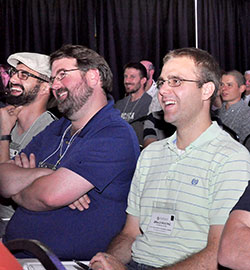Evangelization Supplement
Teachers and campus minister find helpful ‘tools’ and tips

Quanah Jeffires, second from left, and Brad Macke laugh during a general session of the St. John Bosco catechetical conference at Franciscan University of Steubenville in Ohio, on July 16. Jeffries teaches religion at Cathedral High School in Indianapolis, and Macke teaches religion and serves as campus minister at Oldenburg Academy in Oldenburg. (Photo by Natalie Hoefer)
By Natalie Hoefer
STEUBENVILLE, OHIO—Catholic schools provide one of the largest catechetical arenas in any diocese.
With this in mind, the St. John Bosco conference offers a Catholic School track every year.
Quanah Jeffries, a teacher in the theology department at Cathedral High School in Indianapolis, focused on sessions within the Catholic Schools track during the conference, the first he has attended.
He was struck by a running theme throughout the sessions: evangelization.
“So we’re here at a catechetical conference, but there was all this talk about evangelization,” said Jeffries, who attended the conference for the first time. “It’s plain that there had to be evangelization with catechesis. I’m hearing other teachers say that, … and then we come here and it’s acknowledged, and we’re talking about it. That gave me a lot of hope.”
Brad Macke, a religion teacher and campus minister at the Oldenburg Academy of the Immaculate Conception in Oldenburg, also attending the conference for the first time, agreed.
“I really liked Curtis Martin’s explanation on the difference between catechesis and evangelization,” he said, referring to the keynote speaker and founder of Fellowship of Catholic University Students (FOCUS).
“He said it’s the difference between ignorance—‘I don’t know,’ and apathy—‘I don’t care.’ Evangelization overcomes apathy, and catechesis overcomes ignorance.
“People have to care before they want to know more. If you try to teach people who don’t care, that doctrine can fall on deaf ears. So you have to evangelize them first, introduce them to the basic Gospel message.”
And neither of those can happen, said Macke, without another common thread of the sessions he attended: prayer.
“Another common theme was that we as catechists and teachers need to be rooted in prayer,” he said. “To invite people to Christ without me being close to him is contradictory. Prayer comes first. It’s easy to fall into doing things and not just being.
“The conference really drove home for me how important it is for teachers to pray for the students together. I hope to offer to the other teachers [at Oldenburg Academy] who might want to get together once a week, even if for five minutes, to pray for our students and their needs.”
Jeffries received the same message.
“Everyone participates in the formation of the students in their Catholic life and deepening their life in the sacraments—teachers, administration, even janitorial staff,” he added. “That was a big takeaway for the teachers—that this is all of us, not just the theology department.”
One concrete tip Macke walked away with from the conference came from a question he asked of Martin during a question-and-answer session after the FOCUS leader’s keynote address.
“I asked him what intentional discipleship looks like for Catholic school teachers,” Macke recalled.
“He said one way you could do it is to offer the vision of what it means to be a missionary disciple to the class as a whole, and throw that invitation to everyone. So if they come to you, that means that they’re interested and they’re not being forced.
“I’m really excited about that. That’s probably my biggest takeaway.”
Jeffries gained some practical teaching tips from the conference as well.
“There was one session that was specifically about using beauty in catechesis,” he said. “The focus was on art, but it could also be music, film, multiple things.
“People are moved by beauty, attracted to it, opened by it. So when you can show someone the beauty of something, it opens them to the truth of it. It’s a movement of the heart and the mind at the same time.
“I got a lot [from the session] in regard to resources where I can find artwork and commentary to bring that into the classroom more.”
Jeffries also gained a tool for something he was planning on implementing this year in one of his classes.
“I went to a session on praying with Scripture,” he said. “That’s something that I was going to intentionally do—a lectio divina in the classroom. I was going to have to put that together.
“But there was a pamphlet given to each of us right there, with Scripture verses and questions. So I can work from that as my model and have this tool to bring right into the classroom, and help them to read more meditatively and enter into the Scriptures.”
Jeffries appreciated the new ideas and material he received from the conference.
“It’s easy to get into a rut when you’re teaching, and you never want to do that,” he cautioned. “Students and personalities change from year to year, and there are different things going on in the culture, so you have to be able to adjust. This [conference] is going to give me tools for adjusting and making my classes even better.”
With the additional “retreat” component, the conference is a benefit Macke and Jeffries would recommend to any teacher or campus minister.
“It was a good mix of head and heart,” said Macke. “It helped me rest in God’s love, to get back to the source of why I [teach and minister in a Catholic school].”
Jeffries agreed.
“I love this conference so much that I’m just putting it out there for folks to put it on their calendar for next year right now, and tell them, ‘Folks, you’ve got to do this—it’s just great.’ ” †
